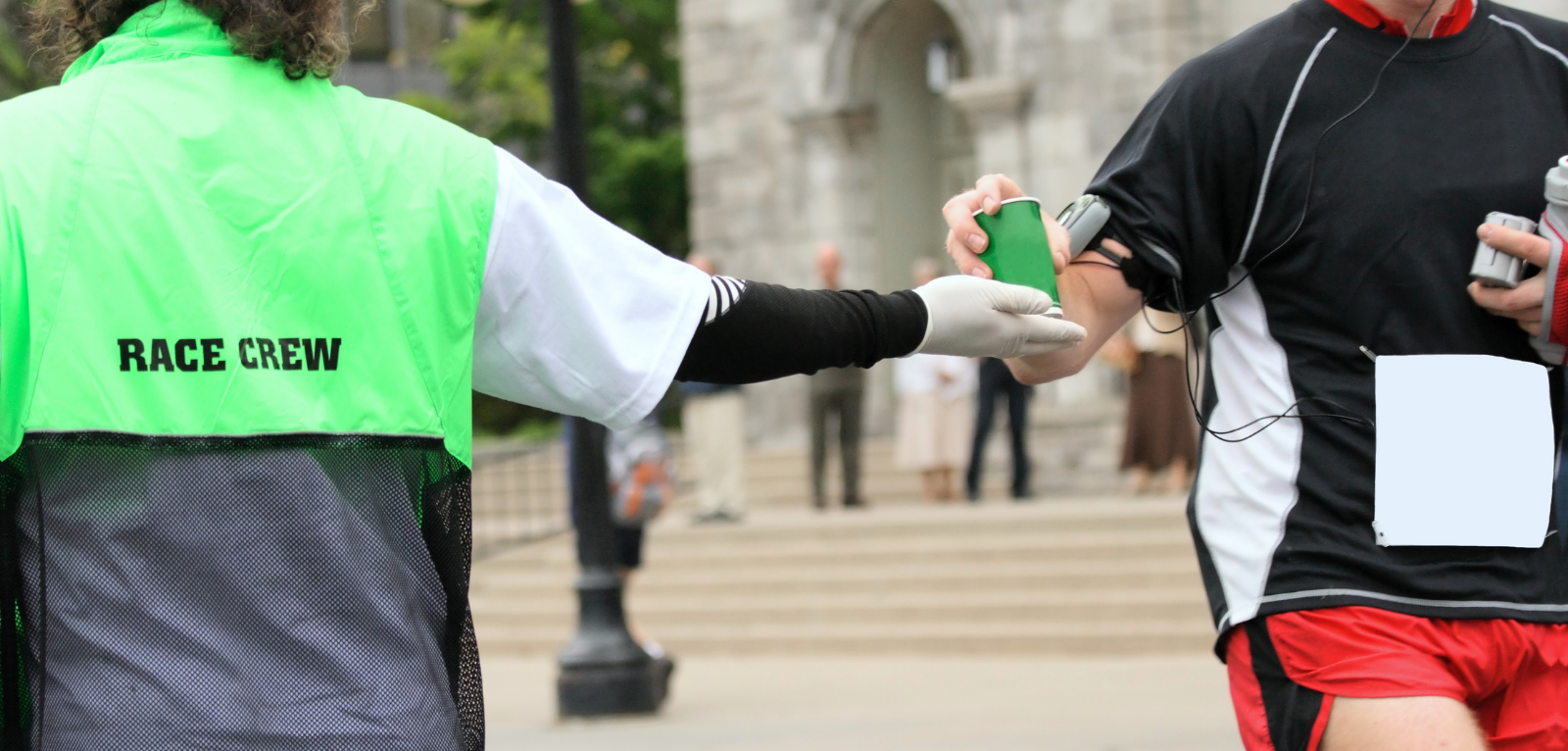Nutrition for Marathon Training
Every marathon runner needs a nutrition plan. How you fuel your body during training will determine how you perform on race day. It can be the difference between finishing the race or calling it quits. The main nutrition-related concerns for marathon trainers include proper fueling, hydration, and meeting higher calorie needs. Training is the time to figure out how much and when you should eat to fuel your runs. Training is also the time to experiment with different types of food, fluid and supplements. It’s the time to learn your food tolerances and preferences. Practice your nutrition plan over and over before competition — that way, there will be far less surprises on race day.
General healthy eating
Eating to support your health and training starts with eating enough. Runner’s World has a handy calculator to help you determine your calorie needs. Many endurance runners have trouble meeting such high calorie needs with large volumes of food. Foods like trail mix, chocolate milk and peanut butter sandwiches are good options for runners who want to pack nutrients but also calories. Desserts and processed foods, while they pack calories, tend to cause digestive issues. It’s best to avoid these foods before, during and after a run.
But there’s more to consider than calories. Just because runners have high calorie needs doesn’t mean that general healthy eating guidelines don’t apply. Running is hard on the body and food does the hard work of repairing the damage so your body can keep training. Here are a few tips for supporting your general health while you train:
– Eat a variety of colorful fruits and vegetables throughout the day. More color means more antioxidants that help fight the inflammation that naturally occurs in the body as a result of exercise.
– Carbohydrates, the body’s favorite fuel source, are the most important nutrient for marathon runners. Choose whole-grain carbohydrates from foods like whole-wheat breads and pastas, oats, brown rice, quinoa, buckwheat and couscous.
– Include moderate amounts of lean protein and healthy fats at every meal to keep you full and prevent you from feeling hungry while you train. It’s critical to include fat in your diet because the body uses fat for fuel during long runs. Protein is essential to repair and rebuild muscles during recovery.
– Stay hydrated with water and sports drinks. Remember, hydration is as important to your training as the food you eat.
Nutrition for short versus long runs
Fueling for short and long runs is different. A long run that lasts more than an hour will require careful attention to the type and amount of food and fluid consumed immediately before, during and afterward. You should plan on carrying carbohydrates (gels, chews, fruit puree, etc.) and water with you when you run. Sports drinks are ideal because they contain a balance of fluid, carbohydrates, sodium and other electrolytes that need to be replaced as you run.
You don’t have to worry as much about eating right before or during a moderate-intensity run that lasts less than an hour. As long as you’re eating to meet your daily calorie needs, you’ll have enough fuel stored away to keep you going on your short run. It’s still important to follow fluid recommendations and consume both carbohydrates and protein within two hours after your workout.
What not to eat before a run
Before we talk about what to eat and when, it’s important to consider what not to eat. Whether your run is long or short, certain foods should be avoided before and during exercise because they can lead to digestive issues and gastrointestinal distress like nausea, vomiting, bloating and diarrhea.
– Within three hours of your run, avoid foods that are high in fat, protein and fiber.
These foods take longer to digest than carbohydrates and will sit in your stomach, potentially causing problems while you workout. This includes processed foods and even some highly nutritious foods like lentils, black beans, cauliflower, and kale. Other foods to avoid include carbonated and sugar-sweetened beverages, and alcohol.
– During your run, avoid all of the foods listed above, as well as juice, soft drinks, sweet tea and energy drinks.
– After your run, refueling with carbohydrates and protein is the priority. Small amounts of fat can be included, but too much can slow digestion and make it hard for carbs and protein to get delivered to your muscles in time for optimal recovery.
Food timing and recommendations for long runs
Long runs of several miles or more benefit from a nutrition plan that considers the timing of food and fluid intake. Poor nutrition planning is often the reason runners experience digestive issues like nausea, vomiting, diarrhea and bloating. The below recommendations will help you determine what foods to eat and when.
– 3-4 hours before your run, eat a balanced meal that’s high in carbohydrates, moderate in lean protein, and low in fat and fiber. You want to leave time for your food to digest while avoiding extreme hunger before your run. Examples include: whole wheat pasta with garbanzo beans and roasted vegetables; stir-fried meat or tofu with vegetables and brown rice; yogurt with berries and granola; turkey and hummus wrap with side salad and apple; or cereal with milk and a glass of orange juice. If you are doing a long run in the morning, make sure that you fuel and hydrate the night before and focus on eating a quick carbohydrate option 30-60 minutes before.
– 30-60 minutes before, you want to eat something that is easy to digest and carbohydrate-focused. For example, pretzels, crackers, dried fruit, and sport beans or gummies.
– During your run, consume 30-60 grams of carbohydrates every hour, starting at one hour into the run. Foods that provide this range of carbohydrates include a medium banana, Clif Bar, applesauce pouch, Gu energy packet, or 16-24 oz sports drink. Sports drinks are appropriate because they replace fluid, carbohydrates, sodium and other electrolytes that need to be replaced. It will be important to consume more than just water during your long run, otherwise you risk over-hydration and low levels of sodium in your blood.
– Within 30 minutes after your run, eat a snack that contains carbohydrates and protein. You want to replenish your body’s carbohydrate stores and repair and rebuild muscles that were damaged during exercise. Examples include 1 cup chocolate milk, 1 cup cranberry juice, 1⁄2 cup applesauce, 1⁄2 whole grain bagel, 12 oz sports beverage, and 1 cup low-fat yogurt. In addition to re-fueling, you should also focus on rehydrating.
A note on hydration
Just like food, fluid needs are highly individual. In general, men need 13 cups of fluid per day, and women need 9 cups. Good sources of fluid can include water, 100% juice, milk, and sports drinks. Exercise-specific recommendations also exist and apply to runners during their long runs:
– 2-3 hours before: 16-24 oz (2-3 cups) of water or sports drink
– 10-20 minutes before: 7-10 oz (about one cup) of water or sports drink
– Every 10-20 minutes during: 7-10 oz water or sports drink.
– Within two hours after:16-24 oz per pound of body weight lost (you can figure this out by weighing yourself before and after your run). Water, sports drinks, juice, and milk are all appropriate.
Fueling your body for any run, short or long, is a key component of optimizing your marathon training. Like a car needing gas in the tank for a long drive, your body needs nutrients readily available to keep it moving on your run. It is important to take advantage of your long training season to try and find what works for you and what doesn’t. After your runs, take the time to write anything down that sticks out to you for future reference. If you felt side cramps at mile 5, take note of what you ate and the timing of when you ate. There is no exact equation, so with much practice and trial and error, you can find fueling options that energize you and keep you healthy and empowered for race day!
Healthcare throughout the United States–has been focused on treating symptoms, rather than proactively addressing issues before they keep you from enjoying life and living it on your terms. At Health Loft, we believe that wellness is the way to go. Which is why our professionals take a proactive, collaborative, and holistic approach to your health and well-being.
If you want a personalized nutrition and hydration plan for your running and fitness goals, you can talk to a Health Loft dietitian in Chicago, IL (virtually via our telehealth platform or in person) by calling us at (312) 374-5399 or by scheduling an appointment online. For more tips and fun facts to also check out our Facebook, Instagram, and Twitter pages for more articles on nutrition, physical therapy, and exercise!
Submitted by Emily Guzman
Edited by Alexander Franz
Reviewed by Morgan Murdock, RD
REFERENCES
Academy of Nutrition and Dietetics. Sports Nutrition Care Manual. Retrieved from https://www.nutritioncaremanual.org. Accessed April 2020.
Fink, Heather Hedrick, Mikesky, Alan E. (2018). Practical Applications in Sports Nutrition (5th ed.). Burlington, MA: Jones & Bartlett Learning.



